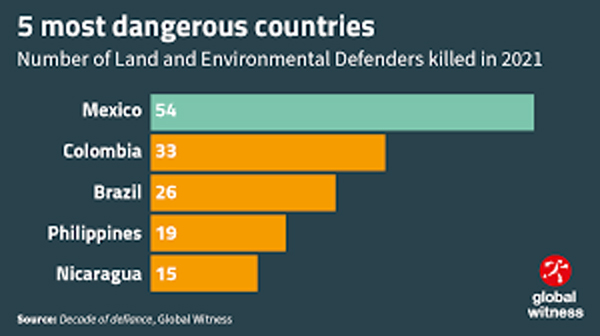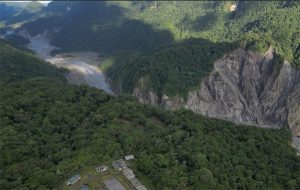
According to a Global Witness report released Wednesday, Mexico is the most dangerous country in the world for environmental activists. More than two-thirds of the 200 deaths of activists worldwide in 2021 occurred in Latin America, with Mexico accounting for 54, Colombia 33, and Brazil 26, says AP. The three countries alone account for more than half of the murders recorded last year. Murders in Brazil had risen from the previous year, while Colombia’s victims saw a drop. As the New York Times notes, Colombia was the most dangerous country in the world for environmental activists in 2020, and Latin America is the most dangerous region: “The attacks against activists are part of a broader regionwide pattern: A combination of rich natural resources, powerful international companies, violent criminal groups and entrenched government corruption, including in some cases officials who play a role in killings, has made Latin America a hot spot for violence.” 78% of the attacks in Brazil, Peru, and Venezuela occurred in the Amazon region.
Global Witness, a watchdog organization, based its report on “a review of credible, publicly available online information… corroborated with organizations on the ground ‘where possible or necessary,’” says the New York Times. Ali Hines, the lead author of the report, explained that in order to be included in the report, “There has to be a very clear link between a defender’s work as a land and environmental defender and their killing.” The organization also tracked forced disappearances of land rights activists last year, recording 19 forced disappearances in Mexico alone. Indigenous activists often found themselves at the forefront of the violence. More than 40% of the murdered activists in Mexico came from Indigenous communities, with at least eight victims from the Yaqui community, says Global Witness.
More Regional
- México and Colombia are implementing rate hikes, as governments across the region work to combat inflation, reports Reuters.
Argentina
- Argentina’s tires are the most expensive in the region, reports Perfíl, with prices sometimes reaching up to 220% higher than in other countries.
Brazil
- The first round of Brazil’s presidential election will be held on Sunday. Reuters notes that turnout will be key to deciding if frontrunner Lula is able to secure a first round victory.
- At The Conversation, Jeffrey Rubin and Rafael Ioris write that “while Lula is running as a leftist, he is perhaps more accurately seen in this election as the best chance to steer the country back to democratic norms.” At Foreign Affairs, Oliver Steunkel writes, “If Bolsonaro loses and refuses to concede, Brazil faces three possible scenarios. The president could insist that the election was stolen but refrain from attempting to stop the transition. Bolsonaro could take a page from his political idol, former U.S. President Donald Trump, and attempt to create a “Brazilian January 6th”—that is, he could incite mayhem that nonetheless stops short of impeding a democratic transition. In the worst case, his supporters could engage in political violence and the armed forces could fail to protect democracy, impeding a normal transition.”
- AP breaks down the key moments from the final presidential debate prior to the election, noting that “the debate quickly devolved into a fierce back-and-forth between (Bolsonaro and Lula), with each lobbing personal insults and the moderator granting them repeated opportunities to respond.”
Caribbean
- “The Japan International Co-operation Agency (JICA) has taken on the mammoth task of helping Caribbean countries address the alarming state and rate of marine pollution in the region, most of which comes from land-based activities,” says Caribbean News Service.
Central America
- “For too long, U.S. policymakers have decoupled the development needs of Central Americans from their increased vulnerability to climate-induced environmental hazards,” writes Paul J. Angelo at CFR, explaining that climate change fuels instability and emigration from the region.
Colombia
- Fernando García Manosalva is the new Director General for Migración Colombia. (Twitter)
Cuba
- Cuba already struggled with food security, maintaining power, and more prior to Hurricane Ian, and now it has only gotten worse. This is why so many Cubans are emigrating, including taking dangerous voyages at sea, writes Abraham Jiménez Enoa at The Washington Post.
- Around 400 people protested in Havana last night, with Cuba now at over two days without power following Hurricane Ian. Just 10% of the island has electricity as of yesterday, reports AP. (see Wednesday’s LADB)
Ecuador
- Failed neoliberal policies have helped fuel growing opposition to the Lasso administration and protests by rural indigenous groups, writes Pablo Andrade Andrade at Aula Blog.
Haiti
- “Haiti’s humanitarian emergency has worsened in recent weeks due to gangs looting humanitarian aid and blockading a major fuel terminal,” writes James Bosworth at the Latin America Risk Report, arguing that both of the two options of doing nothing or international intervention are “bad options.”
Mexico
- Reuters explores disappearances in Mexico, noting that there are currently 105,879 cases of missing individuals, “with many experts and Mexican officials believing the true number is even higher.”
- Around 20 members of ultra-orthodox Jewish sect Lev Tahor, arrested on organized crime and human trafficking allegations, escaped a government shelter where they were being held, reports AP.
Peru
- “Peru’s instability is surprisingly stable,” writes Bello at the Economist. “Erratic government is undermining the effectiveness of administration. Mr Málaga is right that the president is damaging the country. The problem is that removing him won’t necessarily end the damage or the volatility.”
Uruguay
- In Global Americans, Evan Ellis analyzes Uruguay’s relationship with China and the newly-signed Free Trade Agreement between the two countries. “The country’s interest in an FTA with PRC can be explained through its longstanding frustration with the benefits that it has secured from Mercosur membership,” he writes.
Arianna Kohan y Jordi Amaral / Latin America Daily Briefing
http://latinamericadailybriefing.blogspot











